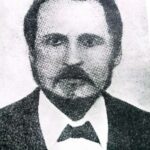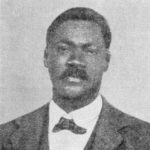OBETSEBI-LAMPTEY, EMMANUEL ODARKWEI
- 6 Min Read
Emmanuel Odarkwei Obetsebi-Lamptey (April 26, 1902-January 29, 1963) was one of the “Big Six”, as the group of nationalists were called who were arrested and imprisoned by the British in 1948 after the riots in that year which started the chain of events that led to Ghana’s independence in 1957. An outspoken critic of the colonial administration, he later became an irreconcilable opponent of the administration of Kwame Nkrumah, the first president of Ghana.

PHOTO CAPTION: Emmanuel Odarkwei Obetsebi-Lamptey SOURCE: EA Library
A Ga, he was born in 1902 at Obetsebi, a small village near Odorkor, a suburb of Accra. His father was Jacob Mills-Lamptey, an Accra businessman, and his mother was Victoria Ayeley Tetteh of Accra. He was educated at the Accra Wesleyan School and Kumasi Government Boys’ School, from which he transferred to the Accra Royal School in 1921 to complete his elementary education. After passing his school certificate examination, he was employed in 1922 as a shorthand typist by A. J. Ocansey, a prosperous merchant from Ada, a port east of Accra at the mouth of the Volta River. In 1923, he passed his civil service examination and became a clerk with the Customs and Excise Department. He worked in Accra till 1930, and in Takoradi till 1934, when he left for the United Kingdom to study law.
Though he had no secondary school education, he studied privately before entering London University. He graduated L.L.B., and was called to the Bar at the Inner Temple in 1939. By then World War II (1939-1945) had begun, and he stayed and worked in England, where he took an active part in student politics and in the agitation for colonial freedom. He returned to the Gold Coast in 1945, and began private law practice.
In 1947, he was returned unopposed to the Legislative Council as a member for the Accra municipal area. His fiery oratory and fierce opposition to the colonial administration won him the title “Liberty Lamptey.” When the United Gold Coast Convention (U.G.C.C.) was formed in 1947, he was one of its founders, and was a member of its executive committee when the February 28, 1948 shooting of Sergeant C. F. Adjetey and two other ex-servicemen took place at Christianborg crossroads.
When the British governor, Sir Gerald Creasy (term of office 1948-1949), declared a state of emergency after the riots which followed the shooting, Obetsebi Lamptey and five others – Dr. J. B. Danquah, Kwame Nkrumah, AKo Adjei, Edward Akuffo-Addo and William Ofori Atta – were arrested on March 12, 1948, and flown first to Kumasi prisons, after which they were dispersed to various places in the Northern Territories.
The “Big Six,” as the detained men came to be known, were released in April 1948 to give evidence before the Watson Commission, established to enquire into the causes of the riots. On March 14, 1949, Obetsebi-Lamptey was appointed to the Coussey Committee, established to formulate proposals for constitutional reforms, on which some members of the “Big Six,” but not Kwame Nkrumah, also served.
After the formation of the Convention People’s Party (C. P. P.) in 1949, the U.G.C.C. fell into disarray. Obetsebi-Lamptey, however, in association with Dr. Danquah and later Akuffo-Addo as members of the Legislative Council, successfully pressed for reforms in 1949-1950. One of these was the repeal of the law which permitted medical doctors with non-British qualifications to practise only in mission hospitals, and not in government or private institutions. But Obetsebi-Lamptey lost the election of February 1951, and his parliamentary career came to an end.
He was thereafter prominent in opposition party circles, though he proved a difficult colleague. His impatience with Danquah and others was based on his extreme opposition to Nkrumah, and his desire to use force to overthrow the Nkrumah administration. He therefore did not take active part in the parliamentary opposition. Though he was a member of the opposition United Party (U. P.) when it was formed in October 1957, he went his own way and made his own plans. Earlier in 1952, as a result of charging some clients exorbitant fees, he was suspended for two years from the bar by a panel of colonial judges. He resumed his practice in 1954.
After the passage of the Preventive Detention Act in 1958, and the detention of some Ga members of the U. P., Obetsebi-Lamptey and some associates began to seek ways to overthrow Nkrumah. In 1961 Nkrumah, then president of Ghana, decided to detain certain U. P. members, including Danquah and Lamptey. Learning this, Danquah telephoned Lamptey and asked him to leave the country. Lamptey then went to Lomé, the capital of Togo but returned to Accra in 1962, staying with a friend named Anum Yemoh at a village named Bawaleshie, a few miles from Accra. At about this time an opposition terrorist movement was formed, in which Obetsebi-Lamptey was alleged to have participated. After a grenade attack upon Nkrumah at Kulungugu in the Upper Region in August 1962, further bomb explosions occurred at C. P. P. rallies in Accra, and in front of the Flagstaff House, Nkrumah’s official residence. A state of emergency was declared, and a search for the terrorists begun.
In connection with the bomb-throwing at Kulungugu, a Special Criminal Division of the High Court, created to hear cases of treason, sedition, rioting and unlawful assembly, tried five people (Obetsebi-Lamptey was not among them) for treason. Three of the accused were acquitted and discharged, and the other two people were guilty. The three judges who composed the court were of the opinion that it was the United Party (the opposition party) and especially Obetsebi-Lamptey, who were responsible for the attempt on Nkrumah’s life.
After allegedly considering a plan to kidnap Nkrumah, he continued to stay at Bawaleshie, where a young girl brought him food every day. But the security service followed the girl and arrested him, placing him in a condemned cell in the Nsawam Medium Security Prison on October 5, 1962. His host was arrested the same day and was tried for treason the following year, found guilty, and condemned to death, but was not executed, and was released after Nkrumah’s downfall in 1966.
In prison the cancer which Obetsebi-Lamptey had developed while in Lomé grew worse. He was taken first to the prison hospital, and then to Korle Bu hospital in Accra, where he was chained to a bed and surrounded by warders. On January 6, 1963 Nkrumah agreed to his release from detention, and on January 25 he returned home. But at this time the identity of the terrorists was learned, arrests were made and Obetsebi-Lamptey was linked with their activities. Nkrumah therefore ordered his re-arrest. On January 28 he was taken back to Nsawam Prison, where he died in a condemned cell the following day. A subsequent commission of enquiry into Ghana’s prison reported that whatever justification there may have been for his detention, the treatment he received was an example of callousness. At first his body was not released to his family, and he was buried near the Densu River in Nsawam, near Accra. In 1966, he was reburied at the Osu cemetery. Rumours that he was buried alive were dispelled by the commission of enquiry. In 1975 an Accra traffic circle was named for him.
L.H. OFOSU-APPIAH




